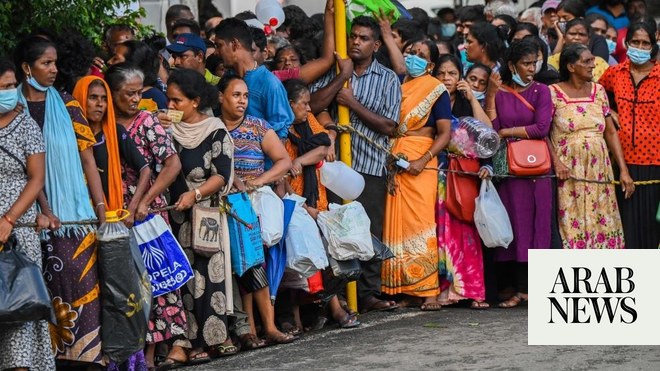
Cash-strapped island country imports more than 80% of its medical supplies
Drug prices surge as doctors warn of distribution delays
COLOMBO: Wasana, a 16-year-old kidney transplant recipient in Sri Lanka, relies on vital medicine to prevent transplant rejection.
But as Sri Lanka’s public health system bears the brunt of the country’s worst economic crisis in memory, Wasana’s family now faces the dual challenge of sourcing new tablets and finding the money to pay for them.
“We can’t not give it to her,” Wasana’s older sister, Ishara Thilini, told Arab News. “In the areas we live in we don’t even have that medicine.”
Most hospitals in Sri Lanka are struggling to provide the universal healthcare that the country was once lauded for, leading to patients like Wasana having to find essential medication elsewhere.
“We are hanging on. But there will be a limit to how long we can do that,” Thilini said.
The devastating economic crisis that has led to political turmoil and ongoing mass protests is now spilling over into the healthcare service and exposing patients to unprecedented vulnerabilities, as doctors warn that they are running out of vital medical supplies and medicines.
The country defaulted on its $51 billion foreign debt for the first time in history last month, as inflation rose to a record high of 39.1 percent. The island nation of 22 million is suffering from shortages of essentials, including food, fuel and drugs.
Sri Lanka imports more than 80 percent of its medical supplies, but with foreign currency reserves running out due to the crisis, hospitals are facing worsening shortages and a reliance on foreign donors.
There is a lack of anesthesia, oxygenators and even betadine in some government hospitals, two anonymous doctors told Arab News. They declined to be named because they are not authorized to speak to the media.
“It’s a very difficult situation for us right now when we can’t do what we need to do,” one said. “It is the patients who are suffering.”
Sri Lanka’s Ministry of Health said that there is a drug shortage and obstacles in procuring essential supplies.
“We need about $32 to 34 million for monthly (drug) expenses, and we are hoping this will come in through donations,” Dr. Hamdani Anver, a Ministry of Health official in charge of coordinating healthcare donations, told Arab News.
Even with help from abroad, the Government Medical Officers’ Association, a trade union of government doctors, said that coordination has been ineffective.
“There is a drug shortage. There has been intervention from the World Health Organization and friendly countries, and expats are also helping at the moment,” Dr. Naveen De Zoysa, GMOA assistant secretary, told Arab News.
“But the ministry has failed to coordinate and there have been delays in distributions.”
Nafeel Jefferey of community development and social welfare nonprofit Care Station said that he has noticed more and more people seeking assistance from the charity.
“We have a website portal and people can enter their needs. Day-by-day numbers are increasing,” Jefferey told Arab News.
There is also a price surge in medicines, he said, as drugs that used to cost about $14 monthly just eight weeks ago now cost about $21.
“There is a shortage of medicines, but more severe is the price hike,” Jefferey added.
Dr. Sanjeeva Gunasekera, a pediatric oncologist at the National Cancer Institute, said that support from foreign donors has been key in keeping things afloat at his hospital.
“So we have been able to procure (medicines). Simply because of this, we have been able to manage without drastically changing treatment plans,” Gunasekera told Arab News.
But drugs are just one part of the medical shortages, he added. There is also a huge need for other medical essentials, such as cannulas and syringes, which are necessary to perform surgeries.
“This is the unseen side of the medical shortage,” he said.












